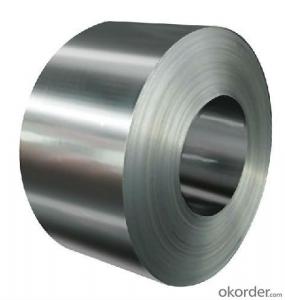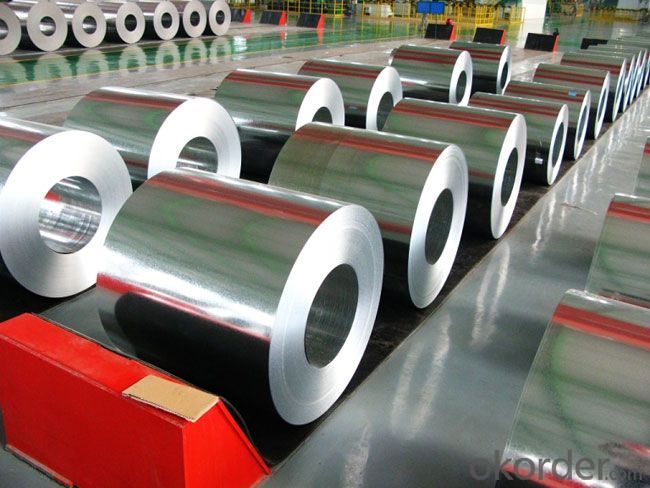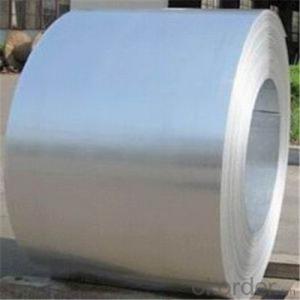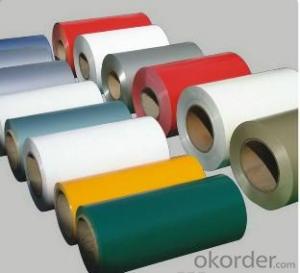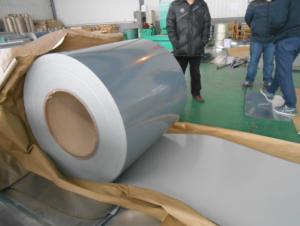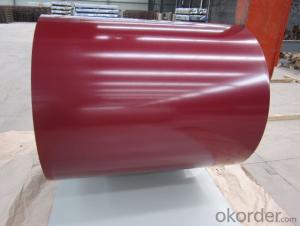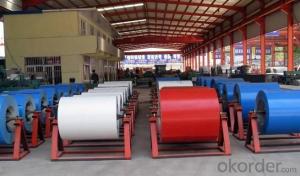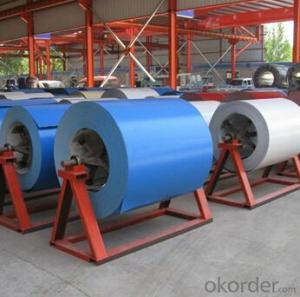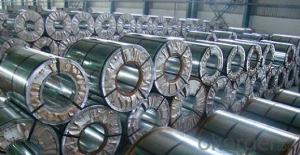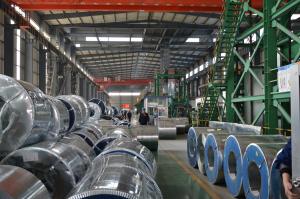Prepainted Galvanized Steel Coil for Construction
- Loading Port:
- China main port
- Payment Terms:
- TT OR LC
- Min Order Qty:
- 50 m.t.
- Supply Capability:
- 10000 m.t./month
OKorder Service Pledge
OKorder Financial Service
You Might Also Like
Prepainted Galvanized Steel Coil for Building Decoration
Hot-dip galvanized steel coils are available with a pure zinc coating through the hot-dip galvanizing process. It offers the economy, strength and formability of steel combined with the corrosion resistance of zinc. The hot-dip process is the process by which steel gets coated in layers of zinc to protect against rust. It is especially useful for countless outdoor and industrial applications. Production of cold formed corrugated sheets and profiles for roofing, cladding, decking, tiles, sandwich walls, rainwater protective systems, air conditioning duct as well as electrical appliances and engineering.
Structure
Thickness: 0.16~1.2mm
Zinc Coating: Z60~Z180
Coil ID: 508/610mm
Coil Wgt.: 2.5~8Mt
Specification
PRODUCT | prepainted galvanized steel coil |
STANDARD | GB/T-12754: 2006, JIS3302, EN 10142, ASTM A653, JIS G3302, SGCC/SGCH, GB/T2518, European Standard, ASTM A792, JIS G3321, JIS G3317 |
BASE PLATE | Cold rolled steel sheet, hot dipped zinc coated steel sheet, hot dipped A-dx51d z100 galvanized steel coil coated steel sheet |
EQUIPMENT | Double coating double baking; three coating three painting |
CAPACITY | 500,000Mt/year |
SIdx51d z100 galvanized steel coilE | Thickness 0.16mm-1.2mm, width 700mm-1250mm |
dx51d z100 galvanized steel coilINC COATING | 60g-180g |
PAINT THICKNESS | Top:20+-5um, back:5-7um |
COIL WGT | 2.5Mt-8Mt |
COIL ID | φ508mm-φ610mm |
BASE SHEET | Cold rolled steel sheet, hot dipped zinc coated steel sheet (small, regular or zero spangle),hot dipped A-dx51d z100 galvanized steel coil coated steel sheet |
SURFACE PAINT | EP, PE, HDP, SMP, PVDF |
COLOR SERIES | RAL color number series |
SURFACE TYPE | Printed, embossed, corrugated |
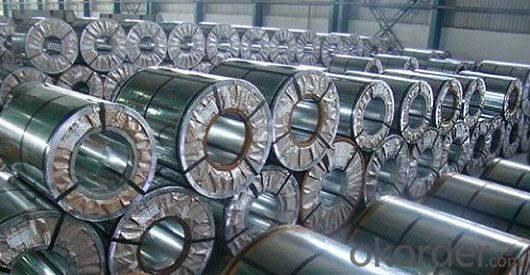
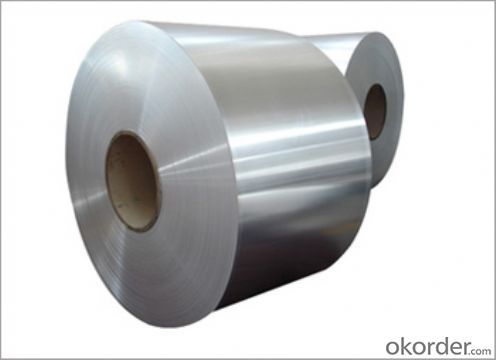
- Q: How do steel coils contribute to seismic resistance in structures?
- Steel coils contribute to seismic resistance in structures by providing strength, flexibility, and energy dissipation. When steel coils are incorporated into the structure's design, they act as seismic dampers, absorbing and dissipating the energy generated during an earthquake. The coils help to distribute and reduce the seismic forces, minimizing structural damage and enhancing the overall stability and resilience of the building. Additionally, the flexibility of steel coils allows them to withstand forces without breaking, ensuring the structure's integrity and safety during seismic events.
- Q: How do steel coils contribute to the renewable energy equipment industry?
- Steel coils play a crucial role in the renewable energy equipment industry by being a key component in the manufacturing of various renewable energy technologies. One of the primary applications of steel coils is in the production of wind turbines. The tower, nacelle, and rotor blades of wind turbines all require steel coils for their construction. In the manufacturing of wind turbine towers, steel coils are used to fabricate the structural components that provide stability and support to the turbine. These coils are typically rolled and welded together to form the tower, ensuring its strength and durability to withstand the forces exerted by the wind. Additionally, steel coils are also used to produce the nacelle, which houses the generator and other essential components of the wind turbine. Moreover, steel coils are used in the production of rotor blades for wind turbines. These blades are responsible for capturing the wind and converting it into rotational energy. Steel coils are used to create the internal structure of the blades, providing the necessary strength and rigidity to withstand the aerodynamic forces. The coils are often combined with composite materials to optimize the performance and efficiency of the blades. Apart from wind turbines, steel coils are also used in other renewable energy technologies such as solar panels. In the manufacturing of solar panels, steel coils are used to create the frames and supporting structures that hold the photovoltaic cells in place. These frames ensure the stability and longevity of the solar panels, allowing them to efficiently capture sunlight and convert it into electricity. Overall, steel coils are vital in the renewable energy equipment industry as they provide the necessary strength, durability, and structural support to various renewable energy technologies. By enabling the production of wind turbines, solar panels, and other renewable energy equipment, steel coils contribute to the expansion and development of the renewable energy sector, thereby advancing the global transition towards cleaner and more sustainable sources of energy.
- Q: How are steel coils used in the manufacturing of industrial boilers?
- Steel coils are used in the manufacturing of industrial boilers as they provide structural support and ensure the durability and strength of the boiler. These coils are often used to construct the boiler's pressure vessel, which contains the water or steam under high pressure. Additionally, steel coils are used for various components such as tubes, pipes, and flanges, which are integral to the functioning of the boiler. Overall, steel coils play a crucial role in the construction and performance of industrial boilers.
- Q: What are the dimensions of steel coils?
- The dimensions of steel coils can vary depending on the specific application and industry. However, they are typically available in widths ranging from 0.5 inches to 72 inches and thicknesses ranging from 0.005 inches to 0.5 inches. The length of steel coils can vary as well, but they are commonly found in lengths of 100 feet to 1000 feet.
- Q: What are the dimensions of a typical steel coil?
- The dimensions of a typical steel coil vary based on its intended use and manufacturer. However, a common range for the inner diameter is between 508 to 610 millimeters (20 to 24 inches), while the outer diameter can range from 1,200 to 2,000 millimeters (47 to 79 inches). The width of a steel coil can range from around 600 to 2,000 millimeters (24 to 79 inches), and the weight can vary from a few hundred kilograms to several metric tons.
- Q: How are steel coils protected against fire and heat?
- Steel coils are protected against fire and heat through a variety of methods to ensure their safety. One of the primary ways to safeguard steel coils is by applying a fire-resistant coating. These coatings are designed to provide a barrier between the steel surface and the heat source, preventing direct contact and reducing the risk of ignition or damage. In addition to coatings, steel coils can also be stored in fire-resistant warehouses or storage facilities. These structures are constructed using materials that are resistant to fire, such as concrete or steel, and are equipped with fire suppression systems like sprinklers or fire extinguishers. These measures help to contain and suppress any potential fire, limiting its spread and protecting the steel coils. Furthermore, fire safety protocols and procedures are often implemented in facilities that handle steel coils. These may include regular fire drills, training programs for employees on fire prevention and response, and the presence of fire safety equipment like fire alarms and fire hoses. These measures ensure that any fire incidents can be promptly detected and addressed, minimizing the risk to the steel coils. Overall, the protection of steel coils against fire and heat involves a combination of fire-resistant coatings, proper storage in fire-resistant structures, and the implementation of fire safety protocols. These measures work together to mitigate the risk of fire and heat-related damage to the steel coils, ensuring their integrity and safety.
- Q: I got a muzzy carp point arrow and its head is steel with 1.7% carbon, its used in the water. Will i have to dry it after every use or is it stainless. Thanks
- Stainless steel is not rust proof. it's just rust resistant. It will rust. It just takes much longer to do so... So, yes, I'd dry it well after use, and even consider wiping it with a cloth containing a very lite coating of oil.
- Q: What are the applications of stainless steel coils?
- The unique properties and characteristics of stainless steel coils contribute to their wide range of applications across various industries. Here are some key areas where stainless steel coils are extensively used: 1. In the manufacturing industry, stainless steel coils play a crucial role in producing automotive parts, kitchen appliances, machinery components, and construction materials. The exceptional corrosion resistance and durability of stainless steel make it an ideal choice for these manufacturing applications. 2. The construction industry heavily relies on stainless steel coils for roofing, cladding, structural supports, and reinforcement. Stainless steel's strength, ability to withstand harsh weather conditions, and aesthetic appeal make it a popular choice in architectural designs. 3. The food processing industry commonly utilizes stainless steel coils for equipment like food storage tanks, conveyors, and processing machinery. Stainless steel's hygienic properties, resistance to corrosion, and ease of cleaning make it suitable for maintaining the purity and safety of food products. 4. In the chemical industry, stainless steel coils are extensively used due to their excellent resistance to corrosion from chemicals and harsh environments. They are employed in the production of storage tanks, pipelines, and reactors that handle various chemicals and corrosive substances. 5. The energy sector extensively employs stainless steel coils in power generation, oil and gas exploration, and renewable energy systems. They are used in heat exchangers, turbine components, pipelines, and offshore structures due to their high resistance to corrosion, strength, and longevity. 6. The medical and pharmaceutical industry relies on stainless steel coils for their biocompatibility and resistance to corrosion. Stainless steel coils are used in the production of surgical instruments, medical implants, and medical equipment that require sterilization and durability. 7. The automotive industry utilizes stainless steel coils for various components like exhaust systems, fuel tanks, catalytic converters, and structural parts. Stainless steel's high heat resistance, strength, and resistance to corrosion and oxidation make it suitable for these automotive applications. These examples highlight the extensive range of applications for stainless steel coils. Their versatility, durability, and resistance to corrosion make them indispensable in numerous industries where reliability and longevity are crucial considerations.
- Q: How are steel coils used in the construction of buildings?
- Steel coils are used in the construction of buildings for various purposes such as structural support, reinforcement, and as raw materials for manufacturing components like beams, columns, and steel plates. The coils are often transformed into different shapes and sizes through processes like cutting, bending, and welding to meet specific construction requirements. They provide strength, durability, and stability to building structures, making them a crucial element in the construction industry.
- Q: What are the cost considerations when purchasing steel coils?
- When buying steel coils, there are several factors to consider regarding cost. To begin with, the price per unit of steel coil is a significant consideration. The cost of steel coils can vary depending on factors such as the type of steel, grade, thickness, width, and length. Higher-grade steel coils tend to be more expensive than lower-grade ones, and thicker or wider coils can also come at a higher cost. Another cost consideration is the quantity of steel coils required. Purchasing larger quantities often comes with volume discounts, so it is important to determine the necessary quantity and assess whether it is more cost-effective to buy in bulk or smaller batches based on demand and storage capacity. Transportation costs should also be taken into account. The weight and size of the coils can impact shipping costs, especially for long-distance transportation. Additionally, the distance between the supplier and the buyer can affect freight charges, so it is crucial to evaluate different shipping options and choose the most cost-effective method. Furthermore, it is essential to consider any additional costs associated with processing or customizing the steel coils. For example, if the coils need to be cut, leveled, or coated, these extra services can add to the overall cost. Obtaining quotes from different suppliers and comparing prices for these value-added services is important. Lastly, the overall quality and reliability of the steel coils must be taken into consideration. Although cheaper options may seem more cost-effective initially, they may end up costing more in the long run if they do not meet required standards or have a shorter lifespan. Choosing reputable suppliers with a history of delivering high-quality products is advisable to ensure that the investment in steel coils is worthwhile. In conclusion, the cost considerations when purchasing steel coils include the price per unit, quantity discounts, transportation costs, additional processing services, and the overall quality and reliability of the coils. Thoroughly evaluating these factors will help make an informed decision that balances cost-effectiveness with the desired quality and specifications of the steel coils.
Send your message to us
Prepainted Galvanized Steel Coil for Construction
- Loading Port:
- China main port
- Payment Terms:
- TT OR LC
- Min Order Qty:
- 50 m.t.
- Supply Capability:
- 10000 m.t./month
OKorder Service Pledge
OKorder Financial Service
Similar products
Hot products
Hot Searches
Related keywords
